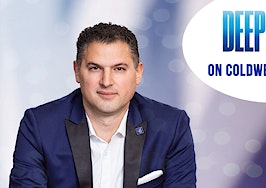 This April, one of Inman’s most popular recurring theme months returns: Back to Basics. All month, real estate professionals from across the country share what’s working for them, how they’ve evolved their systems and tools, and where they’re investing personally and professionally to drive growth in 2022. It’s always smart to go Back to Basics with Inman.
This April, one of Inman’s most popular recurring theme months returns: Back to Basics. All month, real estate professionals from across the country share what’s working for them, how they’ve evolved their systems and tools, and where they’re investing personally and professionally to drive growth in 2022. It’s always smart to go Back to Basics with Inman.
Be authentic.
Focus on differentiators.
And figure out how to measure success.
That was the message David Marine shared when asked what agents need to do to nail the basics of their marketing plans in these crazy times. And Marine is someone who should know.
Marine has spent about two decades in total at Coldwell Banker, gradually moving up the ranks to his current position as chief marketing officer. In the role, he has become one of the most prominent faces of the company, often appearing on stage at conferences to articulate the brand’s marketing strategy.
Case in point: Marine announced that amid an ongoing pandemic and low inventory, Coldwell Banker would spend 2022 focusing on sellers. That effort, which is now known as the “Dream Campaign” kicked off in earnest last month with, among other things, a website refresh. It also included consumer survey that showed large numbers of younger homeowners — 44 percent of Gen Zers and 35 percent of millennials — plan to sell their homes in the next year.
In a conversation with Inman, Marine noted that inventory shortages are the “biggest challenge facing our industry” right now, adding that the latest marketing campaign is designed to help consumers imagine what life would be like if they moved to a new home or city. To that end, it includes digital resources that compare things like walkability and cost of living in different places. The campaign is also unique, Marine added, because historically most real estate marketing focused on buyers. Coldwell Banker’s effort, then, is meant to break some new ground by reaching an underserved segment of the market.
In that context, Inman recently chatted with Marine about what agents can do to cater to those would-be homesellers, and how agents can get back to basics when it comes to their marketing. During the conversation Marine concluded that “there’s room to elevate what agents are doing form a marketing perspective across the broad.”
Here’s what Marine recommended:
Authenticity
Marine’s first piece of advice to agents was to be authentic in their branding — because consumers can see through efforts that are inauthentic. Specifically, he advised real estate professional to be aware of how they’re perceived publicly, and then to consider how their marketing intersects with that public perception.
“If you’re message is authentic and it matches how people perceive you,” Marine said, “they won’t see it as a marketing message.”
His point was that people want meaningful interactions with their real estate agents, rather than a feeling that their being sold something. And by cultivating a sense of connection, agents will have more luck working with the limited number of sellers who are stepping out into the market at this unusual moment in the housing industry.
“What customers really want to know is, ‘can I trust this person with the single largest investment that I’m going to make?'” Marine added.
Differentiators
Marine posed a question for real estate agents to consider as they think about their pitch to consumers: “What is it that you offer that’s different from everybody else?”
He went on to note that a real estate agent’s marketing needs to help get across “what your brand provides and what you offer individually.” There are an infinite number of ideas an agent can attempt to convey. It could be that an agent knows a lot about the local schools. Or has a family. Or has some specialized interest such as art. Or so on. But whatever it is, the important thing to remember according to Marine is that it’s not about jumping on the “soup de jure,” but rather cultivating an identity that captures something unique.
“While logos and catch phrases can get you through the door,” Marine said, “it’s really going to come down to what you offer over everybody else.”
Accountability
Marine’s third tip for agents was to identify a way to measure marketing success. He noted that there’s a cliche of agents with their faces on bus benches, but that in reality agents should focus their marketing efforts on the things that actually have measurable results.
“How is it working?” Marine asked. “Is it helping you save time? Is it creating better returns?”
The way agents measure the success of their marketing will vary, but the point is that the only way for agents to improve their performance is to know what is working and what isn’t.
“How do we continue to elevate,” Marine added, “and not just settle for, ‘Hey, this is good enough’?”













